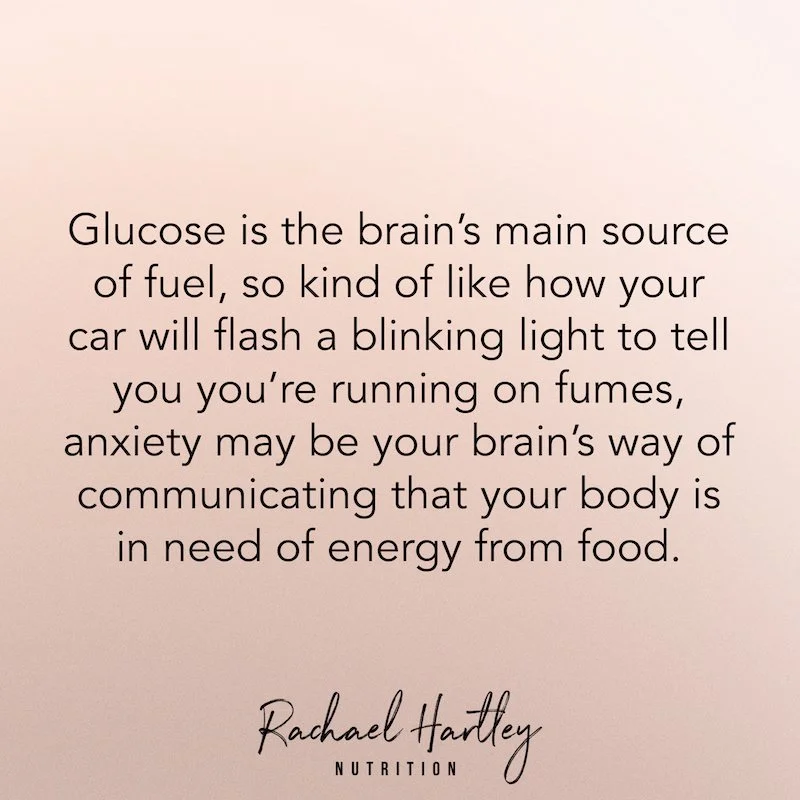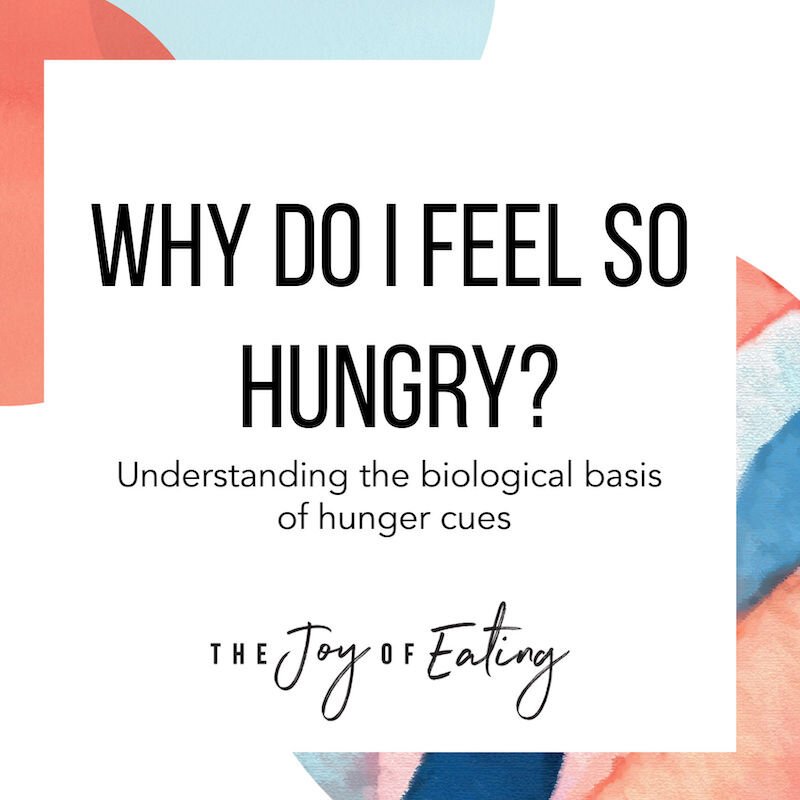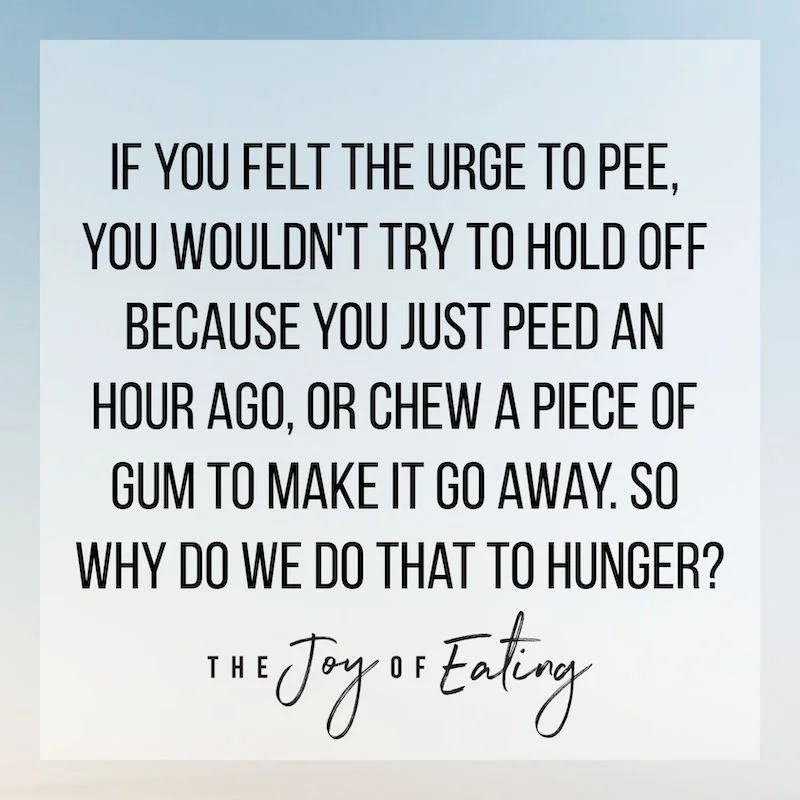Feeling Anxious? You Might Be Hungry!
Feeling anxious? You might be hungry! While hunger is typically felt in the stomach, for some people, anxiety can be a signal that their body needs food. This post explains more…
Pretty much every Monday, I make the same mistake. I try not to check emails on the weekend, a self care boundary I try my best to stick to. But Monday morning, I panic as soon as I wake up. What super urgent email might I have missed??? I always expect there to be some sort of nutrition emergency sitting in my inbox.
And so, I get out of bed, pour my cup of coffee, and immediately get to work. Anything that was an emergency on Saturday morning clearly cannot wait the additional hour for me to shower and eat breakfast.
By the time I’ve worked my way through the inbox, I start to feel like I’m jumping out of my skin with anxiety. But it’s not something I can deep breathe my way through. It’s not a sign for me to take one of my prn anxiety meds. It’s a sign that I need to eat.
When Anxiety is a Sign of Hunger
Most people think of hunger (and fullness) as solely being felt in their stomach, but there are other ways one might experience hunger, like difficulty concentrating, fatigue, thoughts of food - and of course how could one forget hanger. As those Snickers commercials remind us, feeling snappy and homicidal towards the people around you can be a sign that you need food!
Anxiety can be a sign of hunger. This makes sense, because when someone is experiencing hunger, their immediate supply of glucose is running low. Glucose is the brain’s main source of fuel, so kind of like how your car will flash a blinking light to tell you you’re running on fumes, anxiety may be your brain’s way of communicating energy needs. In a way, your anxiety may be a result of your brain’s concern over when it’s getting its next dose of fuel.
A part of your brain called the hypothalamus interacts with the pituitary gland and adrenal cortex (called the HPA axis) to regulate eating and energy balance. I like to think of it as our built in MyFitnessPal - except one that actually knows how much food you need, and wants you to eat adequate amounts of it - not to consume the amount of food a small child would need in an attempt to shrink your body. The hypothalamus is also responsible for regulating stress responses, so it makes a lot of sense that anxiety and hunger are related.
The relationship between anxiety, mood, and hunger is extremely complex, and researchers are untangling how a drop in ones blood sugar (one sign of hunger) affects mood. There’s quite of bit of research looking at fluctuations in blood sugar for people who have diabetes and how it affects mood. In one interesting rat study, rats were given a glucose blocker, which prevented their cells from absorbing glucose from the bloodstream. Even though their blood sugar was within normal limits, cells weren’t getting the glucose they need so rats experienced the symptoms of low blood sugar. This was shown to increase cortisol levels and symptoms of stress. To show that the effect wasn’t only from hunger, the rats were given an antidepressant and the behaviors disappeared and cortisol levels dropped. This demonstrates that there is something going on beyond just a low blood sugar that triggers anxiety.
Are you an emotional eater, or are you undereating?
It’s not uncommon for me to work with a client who says they are struggling with emotional eating, only for that behavior to go away after they begin to fuel their body adequately. Turns out, they’re not emotional eaters - they were just hungry! Yes, they were experiencing intense, uncomfortable emotions and strong cravings for food at the same time, but the former was causing the latter, not visa versa.
This is one of the reasons why when we work with clients, we generally start by teaching them how to fuel their body adequately throughout the day. Often times, people try cognitive or self care techniques to address “emotional eating” behaviors. But no amount of yoga or bubble baths or cognitive behavior therapy will soothe the intense emotions brought on by extreme hunger. Only food can do that.
How do you tell the difference between regular anxiety and hunger-induced anxiety?
It’s often difficult to tell the difference between regular ‘ole anxiety and hunger-induced anxiety, as it can feel the same. If you’re experiencing other physical signs of hunger, like an emptiness in your stomach, pangs, or dizziness, that’s definitely a sign to eat. Usually though, I find it’s helpful to use context clues. If it’s been awhile since you last ate, generally more than 2-4 hours, you’re very likely hungry. If you’ve eaten something recently, it’s much less likely to be hunger.
At the end of the day, if you’re not sure - just EAT! If the anxiety doesn’t go away, you can move on to other coping tools. It may feel uncomfortable to think about eating when you are not hungry, but think of it as a learning opportunity, a chance to better understand what hunger feels like for you. While intuitive eating teaches eating in response to physical cues, that doesn’t mean that sometimes eating when you’re not hungry is wrong - whether it’s for practical reasons, to satisfy taste hunger, or because you’re trying to better understand your body’s signals.
Struggling with your relationship with food? We work with clients virtually and out of our Columbia, SC office. Learn more about our practice philosophy and nutrition services to see if we’re a good fit to work together.







